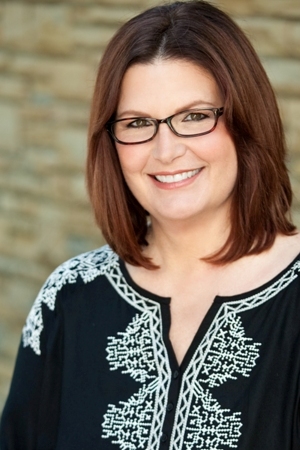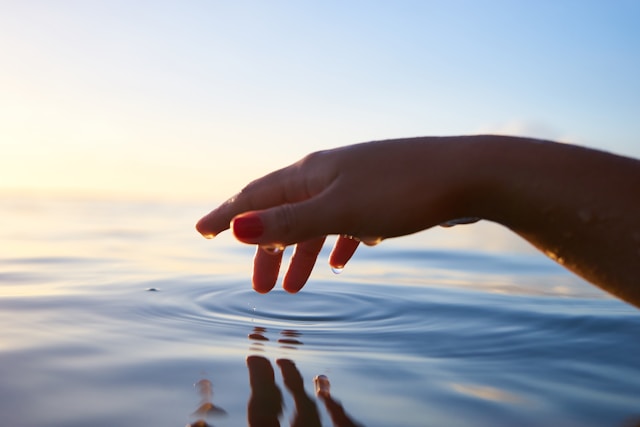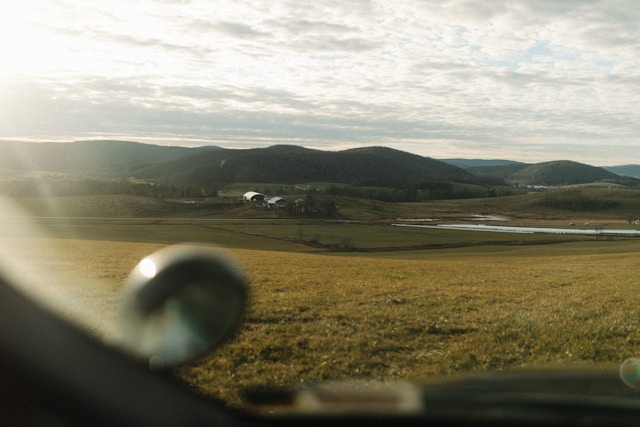Words Too Small
An hour and a half north of Syracuse, I veer my rental car off the interstate. Pastures flank me on both sides, houses dot the landscape. It’s the kind of place where you must make an effort to see your neighbor.
Last time my cousin Karen and I were together, a decade ago, we stood on a boat in the Pacific where I committed my mother’s ashes to the ocean. Now I’m wondering who we might have become since, have second-guessed whether or not we’d still have anything in common. I do not know if she’ll comment on the weight I’ve gained. Fifty pounds is impossible to hide. Will we commiserate or will I see the familiar glance of judgment that we each inherited from the women who came before us?
**
Karen’s new house sits on a large piece of property. Tires crunch over gravel. In front of the closed garage door, I cut the engine. The house appears tidy, sweet. I wander into the back yard. Beyond a rickety wire fence, off to the left, I see a black horse and a white goat. They must belong to the neighbor.
I tap on the back door. Wait. Peer through the window. Then I notice the sign, in Karen’s handwriting, telling folks to check the art shed in back if there’s no answer.
Inside the shed I find only art supplies and the acrid smell of paint thinner. Instantly, I recall the hours I spent during high school, awed, watching Karen, six years my senior, in garages while she handpainted cars and vans with lettering, logos.
Back in the driveway, I text to say I’ve arrived.
She responds: Crap. Go on inside.
I grab my suitcase, have time to look around. Pictures of her grandkids, of her with the new-to-me boyfriend, Chris. I like his smile. Karen deserves every bit of the happiness that has, at times, eluded her and these subtle clues lead me to believe we will mesh as easily as we did before.
I hear the minivan. By the time I get outside, Karen is standing behind the car. Her left arm hangs at her side, the hand shriveled and immobile, the way it’s been for thirty years—the result of an accident that killed her then-husband and nearly killed her. She’s wearing cutoff shorts and a purple ladies baseball-style cap. She turns to me. “Isn’t this beautiful?” she asks, indicating the property.
“It sure is. Let me help.”
We hug. “I want you to meet my friends,” she says, making a click-click noise with her mouth. And that’s when the running starts.
Karen pulls out a half-full bag of Wonder Bread. The horse is barreling toward us, hooves pounding. Karen doesn’t move. My eyes scan the thin wiring that constitutes the only barrier between us. My pulse quickens. Karen is calm and I remember that she would warn me if I needed to be concerned.
It all comes back—those years ago, as I sat beside her in a car she was driving—the left turn blinker ticking. We were first in line. Green light. Karen inched the car forward. Someone honked. “It must be clear,” one of us said. She hit the gas.
We turned left. I saw the pickup’s front grill for one second before it smashed into my door. I screamed. Tires screeched. Glass exploded. Karen reached for me.
Now, in front of the fence, I look at Karen. I look at the horse. Mane hair flying. He’s not slowing down. I step backwards.
Karen pulls a stack of slices out of the Wonder bag. I love horses. Want to feel comfortable in this situation, trust the horse and myself, but I can’t control the anxiety shooting out of chest. The horse won’t be denied, and then, at the wire, he just. . .stops. Tosses his head.
Karen hands me bread. I step beside her. “Watch your fingers,” she says, and I remember the car fishtailing, Karen wrangling the wheel. The car stopped, and I checked for Karen. She was checking on me. “You hurt?” she asked. I shook my head. “You?”
The goat bullies in for bread. Karen laughs. “I can’t believe I get to live like this,” she says.
**
Inside, Karen sits on a small stool in front of the fridge. I unbag groceries. I ask if Greg, Karen’s younger brother, has gotten any better.
Karen frowns. “No.” I feel her frustration, think of Greg, four months ago, calling me for the first time in years. He sounded fine, but I needed to keep the conversation short, was nearly hanging up when he said, “Did you know I almost died?” My fingers gripped the phone. I knew he’d been in an accident two years prior but no, I hadn’t known this part.
Broken ribs. Punctured lung. Fractured pelvis. Broken hip. He’d had several surgeries. “I had no idea,” I said, relieved that the worst hadn’t transpired, stung to be left out of the loop. He was, he said, dealing with medication side effects, chronic pain, insomnia, and memory lapses but added that he was working on healing.
But by our next conversation, several weeks later, Greg had sounded, what? Almost maniacal. Laughing, yelling, interrupting. I could barely understand what he was saying. He was drinking, and I wondered if he’d had a mental breakdown. Now, I learn that he’d spiraled further out of control. Karen was resigned, felt abused. Greg was angry. There were two different versions of the story.
“Do you have any more clarity about what happened?” I ask.
“All I know,” she says, “is that his ex-girlfriend says he went cold turkey off his meds.” Karen’s eyes pinch. “She’s a nurse, the ex, and told him he shouldn’t do that, but he didn’t listen.”
Sounds about right.
Greg and I are only three months apart in age. As kids, he was braver than I, bolder than I, always daring me to follow. Desperate for his approval, I usually acquiesced. In my mind’s eye, I see that damn tire swing, the unfamiliar rushing river, my head breaking the surface, gasping. Standing up, I was covered in tiny leeches. OH MY GOD!, I yelled, tears threatening. Stifling a laugh, he picked them off me one by one.
I feel certain that Greg’s renegade streak, along with razor sharp smarts, was what drove him to become a nuclear engineer and then a naval aviator, to dedicate most of his adult life in service to his country.
“I’ve tried to help him,” Karen says, “but he takes advantage of me or ignores me or blames me. I don’t need that in my life right now.”
I don’t doubt Karen. Greg is generous, he’ll spend his money, give his time, open his heart to the people he cares about. And, as the youngest sibling, he got used to people placating him, reacts poorly when feeling slighted—tendencies I used to also have.
“Well, I appreciate you letting him come here,” I say, wondering now what it will be like when he steps inside this home.
I gather empty grocery bags, thinking. Greg is more alone than he’s ever been. His parents are dead. He’s alienated himself from his friends, his partner, his siblings, his son. I empathize with his pain and with Karen’s resentment. I wonder. This is my family, and something is broken. Brokenness is something I understand. Healing is a work in progress.
Here, in Karen’s kitchen, I identify with her in a new way. Greg, too. Growing up, as family, we were present in each other’s lives, well, just because. My ability to understand us as individuals was limited by my age, my narrow perspective. But now, I know something about suffering and compassion. A decade ago, in the aftermath of my mother’s unexpected death, my teenage daughter sank into a major depressive episode, and I could have lost her. During our journey from one form of treatment to the next I saw only the worst, most ineffective parts of myself. Powerlessness. Imperfection. I grew increasingly sure that I was responsible, that a better mother could somehow love her child well. At my lowest point, with nowhere left to turn, I yielded to a long-neutered desire to make art. Karen, I realize, must have done the same thing.
I’d found a series of videos with simple prompts and simpler techniques for expressing originality through messy, imperfect art. Had lined up a few broken crayons, stubby colored pencils, and some glitter glue. I didn’t know what to do, so I copied the teacher. I tried to be satisfied playing. But over and over again, staring down at the simplistic albeit colorful pages, I encountered my own self-judgment. Goddamn, that’s ugly and I really suck at this and Why do I bother?
I didn’t know why I bothered, but I kept at it. I bought more supplies. As my daughter healed, I kept thinking I should give up on art. But I didn’t give up. Neither did she. And one day, I told myself that everything was okay. It didn’t matter if the pages were ugly, incomplete, or, on rare occasions, glorious. I didn’t need to judge, because each day I began again. No matter what I was worthy. My ability to love others had, I was learning through the messy, imperfect art, been hampered by my inability to love myself.
**
I hear his huge motor home before I see him, and then he slides out of the high driver seat: grey beard, cane, cowboy hat. Too thin. The ache in my chest tells me I’ve missed him and I was right to be worried.
I thrust myself, gingerly, into Greg’s open arms.
“How are you?” I ask.
“Hurting,” he says. “My pain level’s around a six, six and a half.”
“I’m sorry,” I say, looking for Karen. She’s fiddling with some plants.
“Can I hook up in the garage?” Greg asks.
“Sure,” Karen says, and heads inside.
**
The next day, the three of us board a boat on the St. Lawrence River heading to Heart Island and a tour of Boldt Castle. As we chug along, a guide shares tidbits of regional 1000 Islands’ history.
On terra firma, Karen and I match our stride to Greg’s cane. We pause in front for a photo op and so Greg can rest. Exterior porticoes, spires, and landscaping are pristine. Karen sits on the bench beside Greg. I watch the siblings, chatting. My first instinct is relief. And I wonder if they feel my care and concern. Then, a jab of longing in my gut. Close as we used to be and I think still are I’m on the outside and always will be.
Inside, Greg peels off. Karen and I stop at the formal dining room. Its centerpiece is a large wooden, claw foot table. An easel holds an undated black and white photo of the room prior to completion—two men standing among heaps of wooden beams. It’s hard to believe this current scene was once that scene: such grandeur built from disaster.
Our castle tour is self-guided so we meander, diverge, converge. Karen and I meet at the bottom of the central marble staircase. I crane my neck to stare at the stained glass ceiling. “Follow me,” Karen says.
I follow her up and up, so many levels, out of breath. We emerge onto a visitor-friendly part of the roof with a spectacular view of the river and land beyond. We enjoy the vista, the sun. “It’s a farce, you know,” Karen says.
“What is?”
“A docent told me once that the story about Boldt loving his wife so much is a lie. He told me they couldn’t stand each other.”
“What? Why go to all the trouble then? How did he know that?”
Karen shrugs. “Who knows, but doesn’t it figure?”
A breeze gusts off the water. I wonder, Isn’t anything what it appears to be?
I check the time. “We should probably start heading back.” I don’t see Greg anywhere, figure he’ll catch up.
Along the path Karen and I find him, sitting on the grass. “Where’d you guys go?”
“Just all around,” I say.
I don’t add that Karen was content with some Greg-free space. He’d spent the better part of the morning complaining about money matters, his ex, his former job, how cold he was due to losing seventy-five pounds, and his pain level in decimal degrees.
He hands me a shopping bag. “This is for you two.”
I find two sweatshirts and two leather bracelets. “Awww, thank you,” I say, handing Karen the size small and matching black bracelet. “We gotta go.” We’ve got five minutes to make the boat.
I hold out my hand to help Greg up. He grabs on, smiles, grateful, I think, for the inclination.
**
Back in Karen’s car, I get a tour of town. Greg sits in back, complaining again. Good. He’s talking, and I’ve learned how to listen. He explains about trips to the doctor, acupuncture needles, and how angry he is that no one informed him of the dangers of prolonged opioid use, the side effects, withdrawal. “That shit was messing with me.”
“Of course,” I say, as validation. I keep my tone neutral, expression flat.
Karen drives down the road, showing me the waterfront. Wind whips the water into froth. Greg’s stuck on repeat. He’s cold, he’s tired, he’s hurting. “I was using my words, but no one was listening.” This, I know, is a favorite refrain.
Karen squints into the rearview mirror. She is losing her patience. She has, as someone who almost died, who lost her spouse and the use of a limb, been in some degree of emotional and physical pain for thirty years. She knows how to cope. And I know she’s already spoken to him about all of this. But I also know he’s not yet ready to accept responsibility for the changes he needs to make, the difficult reality of this surprise and drastic pivot off course.
“And I need to get this pain level down below a six,” Greg says.
Karen hits the brakes. She’s had enough. “You need to stop doing that, Greg.” We’re in the middle of the road. “Stop numbering the pain. That only makes it worse. Stop complaining about it. That makes it worse, too.” Her tone conveys judgment. “And if you’re cold all the time because you lost weight eat some food.”
“I can’t just eat, Ka-ren,” Greg says, rudely.
My mind races for an intercession. I see what’s happening, understand the communication fracture, can imagine how both of them feel. I think of all I have learned, longing to step in, to make a difference.
“Guys,” I say, but no one’s listening to me. They’re yelling at each other. They haven’t asked for my help, perhaps don’t imagine I have help to give. But I do, and their conflict is taking me back to the darkness I’ve left.
“Guys,” I say louder this time. They stop, and I encourage Karen to tell Greg what worked for her.
She huffs. “The thing that helped me most was family. I—”
“I can’t rely on anyone,” Greg interrupts.
Karen stomps the gas pedal.
**
Late that night, the three of us and Karen’s boyfriend, Chris, walk outside. Karen and Chris remain on the porch, but Greg and I saunter further out into the yard. It’s past midnight. The night air is cold, humid. I hear Chris and Karen chatting. Above us the sky is awash in stars.
“Would you look at that,” I say.
“Yep,” Greg says.
I can feel the presence next door of the horse and goat. I ache to lie down and stare up, wishing, like I used to as a kid.
Changing lifelong patterns takes years of dedicated practice. Images flash through my mind of journal pages I created devoted to reminding myself what to release, what to embrace, how to be at peace with myself. Present. Next to me, Greg shifts his weight.
We’ve known each other our whole lives, but what do we actually know? Perhaps to Greg I’m still the younger version of me, covered in leeches, desperate not to disappoint.
“Someday,” Greg says, “I’d like to drive you down to Assateague. You think this view is something? You’ve gotta see that.”
“I’d love to see that,” I say.
We grow silent again and now, it hits me. The real question each of us has to ask and to answer for ourselves is not if we can fix what seems broken but how we love—truly love—another in the days that grow hard. We are all messy, imperfect. And inherently worthy.
The distance between Greg and I is vast and also nonexistent. Words, too easily misunderstood, are too small, far too incompetent to fill this space. The best way for me to love Greg is to keep listening, keep accepting wherever I am on my journey so I can accept him, without conditions or judgment. This is the kind of love my daughter and I have found and made, the story that being a mother has taught me. Genetic connections—a mother to a daughter, a brother to a sister, a cousin to her cousins—are indisputable. But the greatest connection is the one that is forged when people choose to love each other.
I traveled here to see my family, to reconnect, and to fall in love again, as adults, not in spite of our fallibilities but because of them. Karen and Greg will, I feel certain, forgive each other and I will trust my hard won equanimity, resist the urge to fix.
I yawn. “We should probably hit the hay.”
“I’ve got to pack,” Greg says. He leaves at dawn.
“I’ll help,” I say, and follow him to the motorhome.




